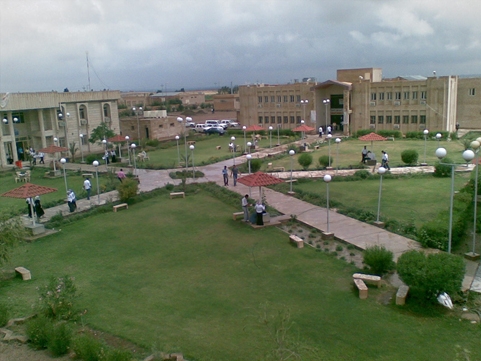You have /5 articles left.
Sign up for a free account or log in.

The Tikrit University campus in more peaceful times.
Tikrit University
Islamic State of Iraq and Syria militants and Iraqi government forces reportedly clashed last week on the campus of Tikrit University, one of several major public universities in Iraq -- along with the Universities of Anbar and Mosul -- located in ISIS-controlled territories. According to a Reuters report, Iraqi government helicopters landed in the university stadium -- one crash-landed -- after which fierce fighting ensued in the colleges of agriculture and sports education.
"The universities are squarely in the line of fire in this conflict," said Jim Miller, the director of the Institute of International Education's Scholar Rescue Fund, which has been gathering information on the situation in Iraq from its more than 250 fellowship grantees there.
In addition to the firefight at the campus in Tikrit, The New York Times and other publications reported in early June that Sunni militants affiliated with ISIS had stormed the University of Anbar, forcing professors and students to flee.
Unlike those in the ISIS-controlled areas, Miller said the universities in Baghdad and the south were able to complete their end-of-term exams. But the conflict to the north and west looms large.
According to reports posted on Iraq’s Ministry of Higher Education website, the University of Basra, in the far southeast of the country, recently organized a seminar on the importance of supporting Iraqi national security forces, and the president of the University of Technology, in Baghdad, has called for faculty and students to mobilize to support Iraqi government forces in the conflict with ISIS.
At the University of Technology, students aren't scheduled to return from summer vacation until the end of August. "I don't know whether we can continue to work [as] normal. It depends," Mohammed Al-Jawad, a professor there and head of the department of petroleum technology, said in a discussion using an online chat program. "[It depends on] what will happen on the ground. Of course if the violence increases in Baghdad this will affect the work, even the working hours."
Materially not much has changed for his life in Baghdad, but psychologically it has, Al-Jawad said. Still, he emphasized, people there are living their lives: on Friday night he had just returned from a family birthday party in a public park.
Lori Mason, the project director for the Iraq University Linkages Program at the International Research and Exchanges Board (IREX) said in her communications with colleagues in Iraq she’s detected weariness and fear, a fear of “the unknown, being so unsure of what’s next and what it means for them. And this is from a very mixed group, there were Kurds, Sunni, Shiite, you name it.”
"They're just so weary right now of all the violence and the instability," Mason said, though she added that there's an optimism that comes through in their emails as well -- the sentiment that "we hope this will end soon and we look for the brighter future."
In the last two weeks, IIE’s Scholar Rescue Fund has received applications from 17 Iraqi scholars seeking temporary visiting lecture posts abroad – “and that’s just the ones who have been able to reach us,” Miller said. (Many other scholars have inquired but have not yet submitted formal applications.) The Scholar Rescue Fund has received reports of academics who have been unable to leave Mosul because they can't access their bank accounts. Several of the scholars who have applied for assistance have been able to flee to safety in Erbil, the capital of the Kurdistan region, but are concerned they will not be able to stay there indefinitely.
At the American University of Iraq, in Sulaimani, Kurdistan, President Dawn Dekle said via email that Sulaimani remains safe and is at a distance of about 100 miles or more from the active fighting. The summer program is operating as planned.
Asked about whether the ISIS insurgency could potentially change the political dynamics of Iraq and Kurdistan and impact the American-style university’s operations, Dekle said, “Operating in Iraq, we are always aware that outside forces may have an impact on the university and its operations. We remain optimistic, however, that the university will be able to continue to provide an American-style liberal arts education to students from throughout Iraq.”




